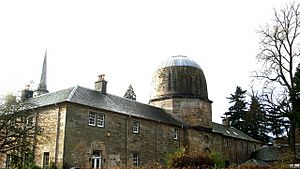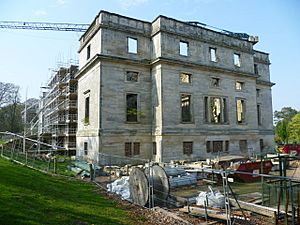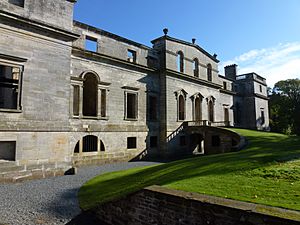Penicuik House facts for kids
Penicuik House (also spelled Penycuik or Pennycuik) is the remains of a once-magnificent country house in Penicuik, Midlothian, Scotland. This grand building was designed in the 1700s in a style called Palladian architecture. It was built by Sir James Clerk, 3rd Baronet on the site of an older house.
Sadly, a big fire destroyed the inside of Penicuik House in 1899. For many years, it was just an empty shell. However, a major restoration project was finished in 2014.
Both the original Penicuik House and the building known as New Penicuik House are important historic sites. New Penicuik House was once the stables, and the Clerk family lived there even before the fire. Both are protected as "Category A" listed buildings by Historic Environment Scotland.
Contents
The History of Penicuik House
Building a Grand Estate
The story of Penicuik House begins in 1646. That year, a man named John Clerk of Pennycuik returned to Scotland from France. He bought the land and title of Penicuik. This area became known as the Penicuik Policies. It was the home and official title for his family for generations.
Designing the Mansion
Penicuik House was built in 1761 by Sir James Clerk. He was the 4th Laird of Penicuik and the 3rd Baronet. Sir James had traveled a lot, especially in Italy. He studied Italian architecture there, which inspired his designs.
The house was built using large, smooth stones called ashlar. It had a central entrance with six columns, known as a hexastyle portico. There was also a grand staircase leading up to the main living floor, called the piano nobile.
Inside the House and the Fire
The inside of Penicuik House was once very beautiful. It had many fine rooms. Sadly, a fire in 1899 completely destroyed the interior. Today, only the roofless stone shell remains.
Penicuik House was a popular meeting place for important thinkers. These people were part of the Scottish Enlightenment. They came to see the house's amazing collection of paintings. This included a famous ceiling painting in "Ossian's Hall" by Alexander Runciman.
A Special Replica: Arthur's O'on

Sir James Clerk was very upset when an ancient Roman temple called Arthur's O'on was deliberately destroyed. To honor this lost building, he decided to build a replica.
In 1760, Sir James had a dovecote built on his stable block at Penicuik House. This dovecote was designed to be an exact copy of the old Roman temple. It stands as a tribute to the original structure.
 | Frances Mary Albrier |
 | Whitney Young |
 | Muhammad Ali |



